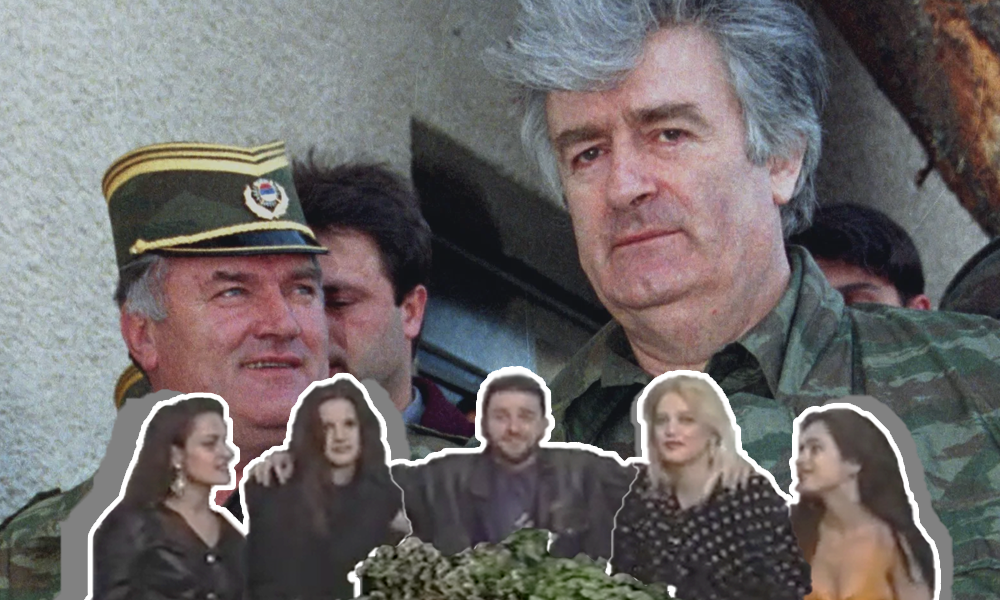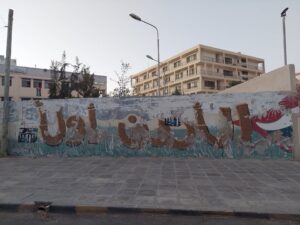Turbo-folk: From an Anthem of Ethnic Cleansing to a Multicultural Device of Progress

Illustration from the author
During my middle school years, I used to put up a framed photograph of Tito on my desk. One day, my mother barged into my room and asked why I idolized an old white man instead of my own father, for instance. As a teenager who consumed more internet memes than parental guidance, I gave her a silent reply: “but Dad didn’t unify Yugoslavia like Tito did.”
One cannot imagine SFR Yugoslavia sans the Brotherhood and Unity principle introduced by Joseph Broz Tito in 1943. The Southeast European region widely known as the Balkans has been a cultural hot mess since the creation of the peninsula itself. There were the Serbs, the Croats, the Bosniaks, the Slovenes, and the Albanians bumping against each other at every chance they got. Luckily, Tito managed to resolve their tension throughout the three and a half decades of his regime, sometimes by the use of force.
The year is 1980. Alas! Tito just died, leaving the six republics scrambled and disoriented without his guidance. Starting with the 1981 protests in Kosovo, their integrity began to crumble. The Communist Party partially dissolved in 1990. Fueled by ethnic tensions, the Ten-Day War between the Yugoslav People’s Army (JNA) and Slovenia resulted in Slovenia’s independence. Croatia, Macedonia, and Bosnia followed Slovenia’s footsteps, leaving Serbia and Montenegro alone in their little kingdom. In 1992, the Bosnian War heated up at the expense of over a hundred thousand people’s lives. Three years later, the first genocide in Europe since World War II was carried out in Srebrenica by the Army of Republika Srpska (VRS) under the command of Ratko Mladić.
These nationalist upheavals and ethnic conflicts that marked the collapse of the former Yugoslavia’s Communist regime did not only shape the Balkans’ political climate, but also its cultural industry. One of the most prominent cultural aspects of the late 80s and early 90s Balkanization phenomenon was the Turbo-folk music, a fusion genre comprised of Serbian folk music with elements of pop, rock, electronic, and hip-hop music… also a great deal of influence from Turkish and Greek folk music. Although initially the genre was heavily associated with mobs, bureaucrats, and war criminals, contemporary Turbo-folk artists have shown a notable shift in their approach to Turbo-folk music production.
Slobodan Milošević: the Godfather of Early Turbo-folk
The birth of Turbo-folk music cannot be separated from the fact that unlike Tito, the successors of ex-Yugoslavia were keen on using mass media—particularly television—as a means of propaganda. For example, TV Pink, a monopolistic omnipresent media giant funded and ran under the political patronage of Mirjana Marković (Milošević’s spouse) and her party, JUL (Yugoslavian Left) overtook the steering wheel of Turbo-folk music’s production and created the genre in their own image.
The ideologically-shaped contents of TV Pink promoted new Serbian elites along with their problematic values of war-profiteering, national-chauvinism, crime and violence, also oppression and pornographic sexuality. That’s why early Turbo-folk music was characterized by sports car-driving hot women singing politically-fueled lyrics while being espoused by war criminals. A Turbo-folk star, Ceca, was married to Željko “Arkan” Ražnatović for five years during the heights of her career. For starters, Arkan was the head of the Serb Volunteer Guard, also known as the Arkan’s Tigers. Unsurprisingly, one of his ‘tigers’ made a modeling debut in Ceca’s music video for ‘Nije Monotonija’.
Under the reign of Milošević, politically critical and subversive music like rock and pop were not granted a place anywhere near the mainstream popular culture. Turbo-folk music was utilized as a disguise to Serbia’s harsh social reality consisting of UN economic sanctions, armed conflicts with neighboring countries, and its ultimate economic downfall. Turbo-folk eventually became the background music of Serbia’s isolation from the international society, an upbeat soundtrack for ethnic cleansing even.
“God is a Serb, and He Will Protect Us”
One of the first Turbo-folk tunes that I was involuntarily introduced to is a morale boosting song for Serbian forces during the Yugoslav Wars titled ‘Karadžić, Lead Your Serbs’ or more widely known as ‘Serbia Strong’. This song celebrates the Serb fighters alongside a wartime Bosnian Serb leader Radovan Karadžić for the killing of Bosniaks and Croats. Karadžić was found guilty of genocide, crimes against humanity, and violations of the laws or customs of war in 2016 with 40 years of prison sentence. The sentence was later increased to a lifetime imprisonment at an appeal court in The Hague in 2019.
Another Turbo-folk piece popularized by the internet meme culture is titled ‘Jadna Bosno Suverena’ by Miro Semberac. Its content is so offensive, ranging from deeming “it is pointless to follow Ramadan’s fast” to threatening to “blow all the mosques up”. On the other hand, Grup Koridor’s song titled ‘Oj Alija Aljo’ questions Bosnian leader Alija Izetbegović how many Ramadans he thinks he will have. More explicitly, Baja Mali Knindža states his hatred towards Izetbegović through ‘Ne volim te Alija’ (literal translation: I do not like you, Alija) because he is a balija (a pejorative term for Muslims, meaning an uncultured peasant or “scum”).
Risen from Ruins
Despite the still ongoing debates over Kosovo’s sovereignty after it declared independence from Serbia in 2008, the current situation in the Balkans is considerably peaceful. Most of the people indicted in the International Criminal Tribunal for the former Yugoslavia (ICTY) have been serving their sentences, with Ratko Mladić being the latest convict to be found guilty as of June 8th, 2021.
Turbo-folk music has slowly disembarked from the national-chauvinist ship of government’s propaganda. According to Jennifer C. Lena, “Turbo-folk has muted its nationalistic and ethnic themes and transformed into a sort of Balkan pop music,” with additional remarks addressing the genre as “a multicultural pop phenomenon”. Not only its aesthetics and contents, the audience of such cultural product has also shifted significantly.
With the growing progressive tendencies among the younger population of Southeastern Europe, the region is no longer defined by a simple label of “conservative” or “misogynist”. Their political and social viewpoints mostly differ from the traditional older generation’s. The contemporary Turbo-folk scene has shown more acceptance towards minority groups such as immigrants and the LGBTQ+ community.
The prominent role of women in the industry itself can be a turning point for female Serbian artists to further express their identity. At the 2007 Eurovision Song Contest held in Helsinki, lesbian singer Marija Šerifović delivered a touching folk ballad performance dressed in a suit while being surrounded by other women in the same attire. This public expression of gender non-conformity has marked a meaningful reform in Serbian society’s attitude towards progress, very much distinct from the 90s circumstances.
Serbian folk diva Jelena Karleuša—also referred to as the ‘Lady Gaga of Serbia’—also likes to express her support towards the LGBTQ+ community by denouncing homophobia, transphobia, and biphobia through her Instagram page. Not only in social media, she also promotes drag aesthetics, a symbol of inclusivity towards the gay community in her music video for ‘Slatka Mala’.
It is safe to say that a certain artistic genre cannot forever be a tool of oppressive genocidal governments to perpetuate their messed-up values of humanity. As an audience ourselves, we can also choose what values we want to extract from an art and apply what we think fits our own moral compass best.
References
Canatan, Kadir. (2014). Multiculturalism in Europe and the Balkans. Adam Akademi 4, no. 2 : 13-26.
Carmichael, Cathie. (2013). Watch on the Drina: Genocide, War and Nationalist Ideology. History 98, no. 4 (332) : 592-605.
Kronja, Ivana. (2004). Turbo Folk and Dance Music in 1990s Serbia: Media, Ideology and the Production of Spectacle. The Anthropology of East Europe Review 22, no. 1: 103-114.
Lena, Jennifer C. (2012). Banding Together: How Communities Create Genres in Popular Music. Oxford: Princeton University Press.
Šentevska, Irena. (2014). “Turbo-Folk” as the Agent of Empire: On Discourses of Identity and Difference in Popular Culture. Journal of Narrative Theory 44, no. 3 : 413-41.
Vezovnik, Andreja, and Ljiljana Šarić. (2015). Introduction: Constructing Balkan Identity in Recent Media Discourses. Slavic Review 74, no. 2 : 237-43.
Anggita Andrea Larasati is a sophomore studying Law in Universitas Indonesia. She can be found on Instagram with the username @andylarasati





